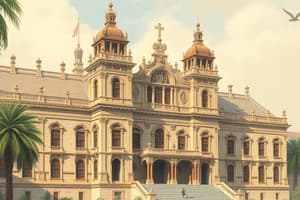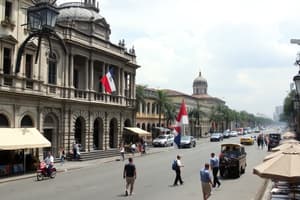Podcast
Questions and Answers
Which philosopher was a leading proponent of the Providential View of history?
Which philosopher was a leading proponent of the Providential View of history?
- St. Augustine (correct)
- Marx
- Bossuet
- Herodotus
In the study of history, what does the Relativist view imply about the relationship between history and sociology?
In the study of history, what does the Relativist view imply about the relationship between history and sociology?
- They are completely unrelated fields
- History creates its own subject (correct)
- They have a chaotic and unpredictable connection
- Sociology dictates the course of historical events
Which concept aligns with the Progressive view of history mentioned in the text?
Which concept aligns with the Progressive view of history mentioned in the text?
- History is cyclical
- Mankind is getting better and better (correct)
- Events occur randomly
- History repeats itself
Who among the following was NOT listed as a leading proponent of the Progressive view of history in the text?
Who among the following was NOT listed as a leading proponent of the Progressive view of history in the text?
What distinguishes the Modern Definition of history from the Traditional Definitions according to the text?
What distinguishes the Modern Definition of history from the Traditional Definitions according to the text?
How does the Traditional Definition of history differ from the Modern Definition based on the text?
How does the Traditional Definition of history differ from the Modern Definition based on the text?
What is the main focus of studying the history of a country according to the text?
What is the main focus of studying the history of a country according to the text?
Which school of thought in the study of Philippine history aimed at preparing the people for membership in the Spanish community of nation?
Which school of thought in the study of Philippine history aimed at preparing the people for membership in the Spanish community of nation?
Who were the representatives of the Clerico-Imperialist School in the study of Philippine history?
Who were the representatives of the Clerico-Imperialist School in the study of Philippine history?
What is the primary focus of the Malolos Republic Constitution?
What is the primary focus of the Malolos Republic Constitution?
Which school in Philippine history was driven by the ideology that American civilization was superior?
Which school in Philippine history was driven by the ideology that American civilization was superior?
When was the Biak-na-Bato Republic Constitution promulgated?
When was the Biak-na-Bato Republic Constitution promulgated?
Which school viewed history as a reconstruction of the past reflected in records?
Which school viewed history as a reconstruction of the past reflected in records?
During which period was the 1943 Constitution effective?
During which period was the 1943 Constitution effective?
What was the objective of the Nationalist School in the study of Philippine history?
What was the objective of the Nationalist School in the study of Philippine history?
Which constitution provided a condensed version of the 1943 constitution with only a preamble and 12 articles?
Which constitution provided a condensed version of the 1943 constitution with only a preamble and 12 articles?
What was the main purpose of the Commonwealth Government in 1935?
What was the main purpose of the Commonwealth Government in 1935?
Which constitution served as the fundamental law of the land from 1935 to 1972?
Which constitution served as the fundamental law of the land from 1935 to 1972?
During which president's term was the convention opened to write a new constitution in the Philippines?
During which president's term was the convention opened to write a new constitution in the Philippines?
What was the purpose of writing a new constitution in the Philippines during Ferdinand Marcos' second term?
What was the purpose of writing a new constitution in the Philippines during Ferdinand Marcos' second term?
Which constitution was later called the 'Freedom Proclaimed Constitution'?
Which constitution was later called the 'Freedom Proclaimed Constitution'?
What type of government administers the Philippine government?
What type of government administers the Philippine government?
Which article of the 1986 Freedom Constitution focuses on implementing reforms mandated by the people?
Which article of the 1986 Freedom Constitution focuses on implementing reforms mandated by the people?
In what year was the 'Freedom Proclaimed Constitution' adopted in the Philippines?
In what year was the 'Freedom Proclaimed Constitution' adopted in the Philippines?
Which organization was considered a secret organization during the Spanish colonial period in the Philippines?
Which organization was considered a secret organization during the Spanish colonial period in the Philippines?
Who is known for being the author of Noli Me Tángere and El Filibusterismo?
Who is known for being the author of Noli Me Tángere and El Filibusterismo?
Which doctrine is described as a national fruit of conquest in the Philippines?
Which doctrine is described as a national fruit of conquest in the Philippines?
What were the three fundamental objectives or aims of the Katipunan organization?
What were the three fundamental objectives or aims of the Katipunan organization?
Who was the publisher of La Solidaridad, the principal organ of the Philippine movement during the Spanish colonial period?
Who was the publisher of La Solidaridad, the principal organ of the Philippine movement during the Spanish colonial period?
What did the Regalian Doctrine emphasize regarding colonial governance?
What did the Regalian Doctrine emphasize regarding colonial governance?
Study Notes
Providential View of History
- A leading proponent of the Providential View of history was Hegel.
Relativist View
- The Relativist view implies that history and sociology are interconnected, emphasizing that historical understanding is influenced by sociocultural contexts.
Progressive View of History
- The concept aligning with the Progressive view of history is the idea of continuous social improvement and reform.
Non-Proponent of Progressive View
- Karl Marx was NOT listed as a proponent of the Progressive view of history.
Modern vs Traditional Definitions of History
- The Modern Definition of history focuses on critical analysis of sources and understanding historical context, distinguishing it from Traditional Definitions centered around chronological accounts.
Traditional Definition of History
- The Traditional Definition often emphasizes a narrative of past events without critical scrutiny, while the Modern Definition incorporates methodological rigor.
Focus of Country's History
- Studying the history of a country primarily aims to understand its identity, culture, and social dynamics.
Philippine History schools of thought
- The Clerico-Imperialist School aimed at integrating Filipinos into the Spanish colonial community.
Representatives of Clerico-Imperialist School
- Key figures include Jose Rizal and other prominent Filipino reformists who advocated collaboration with Spanish authorities.
Malolos Republic Constitution
- The primary focus was establishing a democratic government, reflecting the desires for independence and national identity.
Ideology of American Superiority
- The Americanization School propagated the belief in the superiority of American civilization.
Biak-na-Bato Republic Constitution
- The Biak-na-Bato Republic Constitution was promulgated in 1897.
Recording History
- The school that viewed history as a reconstruction of the past through records is the Historical Interpretation School.
1943 Constitution Duration
- The 1943 Constitution was effective during the Japanese Occupation from 1943 to 1945.
Objective of Nationalist School
- The Nationalist School aimed to foster a sense of nationalism and assert Philippine identity against colonial rule.
Condensed 1943 Constitution
- The 1986 Freedom Constitution provided a simplified version of the 1943 Constitution, featuring only a preamble and 12 articles.
Commonwealth Government of 1935
- The main purpose was to prepare the Philippines for full independence while establishing self-governance under American oversight.
Fundamental Law from 1935 to 1972
- The 1935 Constitution served as the fundamental law throughout the Commonwealth period until the martial law era.
Constitution Convention Under Marcos
- The convention to write a new constitution was opened during Ferdinand Marcos' term in 1971.
Purpose for New Constitution in Marcos' Term
- The aim was to legitimize and consolidate Marcos' power through structural changes in governance.
'Freedom Proclaimed Constitution'
- The 1973 Constitution was later referred to as the 'Freedom Proclaimed Constitution' after the lifting of martial law.
Government Type in the Philippines
- The Philippine government operates as a democratic republic.
Article on Reforms in 1986 Constitution
- Article II of the 1986 Freedom Constitution focuses on implementing reforms as mandated by the Filipino people.
Adoption Year of 'Freedom Proclaimed Constitution'
- The 'Freedom Proclaimed Constitution' was adopted in 1973.
Secret Organization During Spanish Rule
- The Katipunan was considered a secret organization during the Spanish colonial period.
Author of Key Novels
- Jose Rizal is known for writing "Noli Me Tángere" and "El Filibusterismo."
National Doctrine of Conquest
- The Regalian Doctrine is described as a national fruit of conquest in the Philippines, asserting state ownership over land.
Objectives of the Katipunan
- The three fundamental aims of the Katipunan organization included seeking independence, promoting social reforms, and fostering national identity.
Publisher of La Solidaridad
- La Solidaridad, the principal organ during the Philippine reform movement, was published by Graciano López Jaena.
Regalian Doctrine Emphasis
- The Regalian Doctrine emphasized that all lands are public lands, thus reinforcing colonial governance structures that prioritized state control.
Studying That Suits You
Use AI to generate personalized quizzes and flashcards to suit your learning preferences.
Description
Test your knowledge on the legacy of Spanish colonialism in the Philippines, focusing on key figures like José Rizal, Graciano Lopez Jaena, and doctrines such as the Regalian Doctrine. Explore the impact of colonial governance and development on Philippine history.




